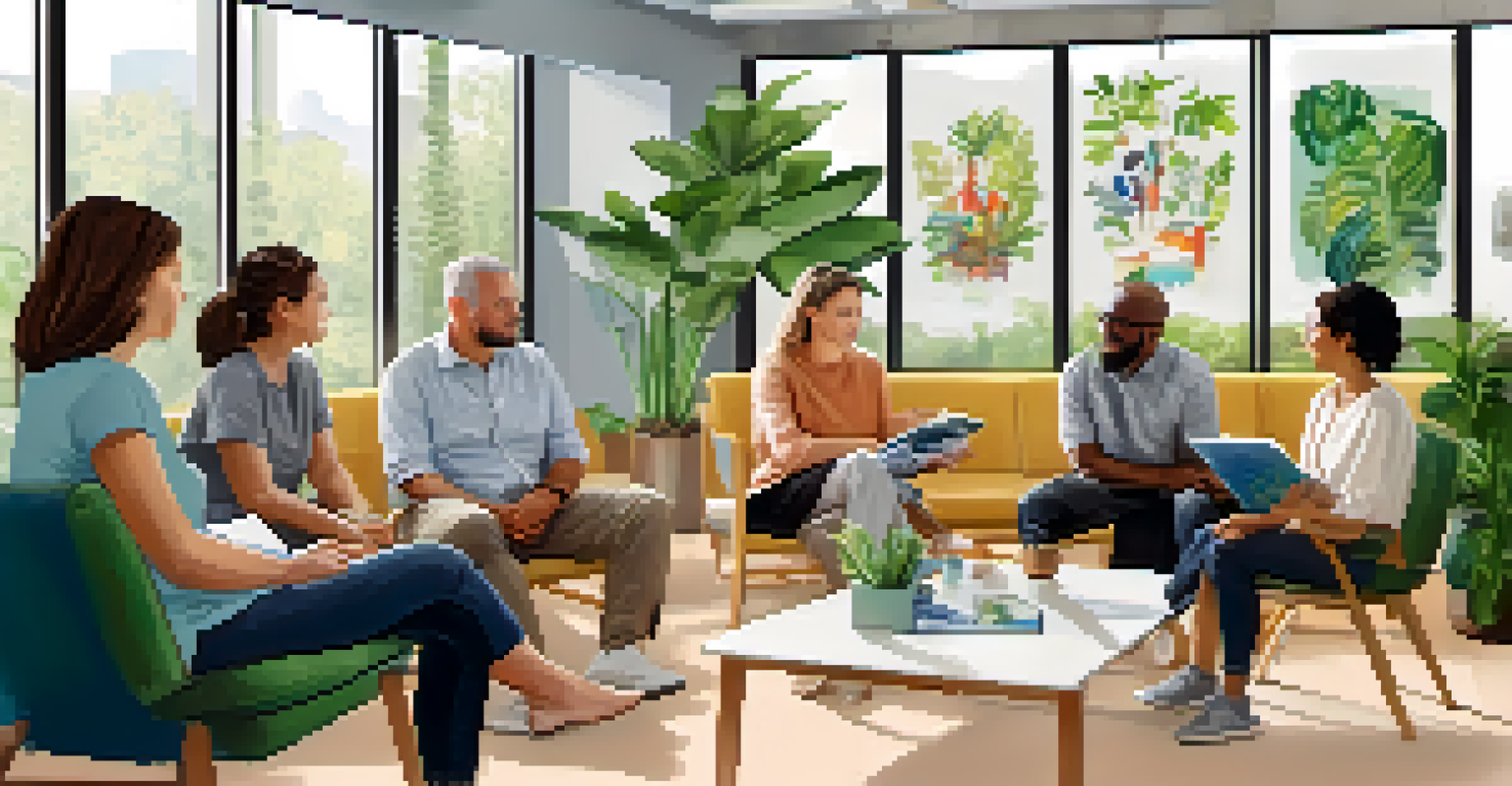Group Dynamics: Enhancing Therapy with Hallucinogens

Understanding Group Dynamics in Therapy Settings
Group dynamics refer to the social interactions and relationships that develop in a group. In therapy, these dynamics can significantly impact individual experiences and outcomes. When participants engage with one another, they create a shared space that fosters connection and understanding, which can be especially beneficial in therapeutic contexts.
The greatest discovery of my generation is that a human being can alter his life by altering his attitudes.
In hallucinogen-assisted therapy, group dynamics become even more pronounced. The altered states of consciousness induced by hallucinogens can lead to heightened emotional exchanges and deeper connections among group members. For many, this shared journey can enhance feelings of empathy and support, making the therapeutic process more profound.
Moreover, effective group dynamics can encourage participants to explore their vulnerabilities. When individuals feel safe and supported by their peers, they are more likely to delve into personal challenges, leading to breakthroughs that might not occur in solitary settings. Thus, the interplay of group dynamics and hallucinogens can create a unique therapeutic environment.
The Role of Trust in Group Dynamics
Trust is a cornerstone of effective group dynamics. In therapy, it allows participants to open up and share their experiences without fear of judgment. When individuals trust each other, they are more willing to engage in deep conversations, which is crucial for therapeutic progress, especially in hallucinogen-assisted settings.

Building trust within a group can take time, but it's essential for creating a safe space. Facilitators can enhance trust by promoting openness and vulnerability among participants. Techniques such as sharing personal stories or engaging in trust-building exercises can pave the way for deeper connections, making the therapy experience more impactful.
Group Dynamics Enhance Healing
Engaging with others in therapy fosters connection and understanding, crucial for personal breakthroughs.
Once trust is established, it can lead to transformative experiences. Participants often find that their emotional journey is mirrored by others in the group, creating a sense of solidarity. This shared understanding can be a powerful catalyst for healing, as individuals realize they are not alone in their struggles.
Creating a Safe Space for Exploration
A safe space is vital for any therapeutic process, especially when hallucinogens are involved. Participants need to feel secure to explore their inner worlds and confront difficult emotions. Creating this environment is a collective effort that relies heavily on positive group dynamics and the presence of a skilled facilitator.
We are all in this together, and we are all connected. It’s time we recognize that and treat each other accordingly.
Facilitators play a crucial role in maintaining a safe atmosphere. They can set boundaries, ensure respectful communication, and guide discussions in a way that keeps participants feeling supported. By actively managing the group dynamics, facilitators can help participants navigate their experiences more effectively.
When participants feel safe, they are more likely to engage in meaningful exploration. This can lead to insights that promote personal growth and healing. A supportive group can amplify these insights, as members can share their perspectives and reflections, enriching the overall therapeutic experience.
The Impact of Shared Experiences
Shared experiences are a powerful aspect of group dynamics in therapy. When individuals undergo similar hallucinogenic journeys, it creates a unique bond among them. This shared experience can foster a sense of belonging and connection that is often transformative.
Moreover, discussing these experiences can provide additional layers of understanding. Participants may interpret their journeys differently, and sharing those interpretations can lead to new insights for everyone involved. This collective processing of experiences can enhance the therapeutic impact of the session.
Trust is Essential in Therapy
Building trust among group members allows for open sharing and deeper emotional exploration.
Sharing also reinforces the idea that everyone has unique perspectives, but they can still find common ground. It encourages openness and empathy, as participants learn to appreciate each other's journeys. Ultimately, these shared experiences contribute to a richer therapeutic landscape.
Facilitator's Role in Enhancing Group Dynamics
Facilitators are key players in enhancing group dynamics during hallucinogen-assisted therapy. Their ability to guide discussions, maintain a respectful atmosphere, and encourage participation significantly impacts the group's experience. A skilled facilitator can help participants feel valued and heard, which is essential for effective therapy.
One of the facilitator's primary responsibilities is to monitor the group's emotional climate. They can identify when tensions arise and intervene constructively. This proactive approach can prevent misunderstandings and help maintain a positive group dynamic throughout the session.
Additionally, facilitators can encourage participants to share their experiences and insights. By prompting discussions and asking thought-provoking questions, they foster an environment of exploration and learning. This engagement not only enhances the therapeutic process but also strengthens the bonds within the group.
Navigating Challenges in Group Dynamics
While group dynamics can enhance therapy, they can also present challenges. Conflicts may arise due to differing opinions, emotional responses, or personal histories. Navigating these challenges requires skill and awareness from both facilitators and participants to ensure a productive therapeutic environment.
Facilitators must be prepared to address conflicts openly and constructively. This often involves mediating discussions, encouraging empathy, and helping participants articulate their feelings. By fostering a culture of understanding, facilitators can help the group move past conflicts and focus on healing.
Facilitators Guide Group Experiences
Skilled facilitators play a key role in enhancing group dynamics and ensuring a supportive therapeutic environment.
Participants also play a role in navigating these dynamics. By approaching conflicts with an open mind and a willingness to understand others' perspectives, they contribute to a more harmonious environment. This collaborative effort is essential for maintaining the therapeutic benefits of the group experience.
The Future of Group Therapy with Hallucinogens
The future of group therapy utilizing hallucinogens is promising, as research continues to uncover their therapeutic potential. As society becomes more open to these substances, the integration of group dynamics in therapeutic settings is likely to gain traction. This evolution could lead to more accessible and effective treatment options for various mental health challenges.
Moreover, as more studies are conducted, we may see the development of best practices for facilitating group therapy with hallucinogens. These guidelines could help therapists create optimal environments that leverage the power of group dynamics, ensuring participants receive the maximum benefit from their experiences.

Finally, the ongoing conversation around mental health and alternative therapies further emphasizes the importance of community support. As group therapy with hallucinogens becomes more widely accepted, it could pave the way for innovative approaches to healing that prioritize connection and shared experiences.